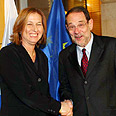
Berlin: In 1994 a German visionary leader, Helmut Kohl, led the Council of the European Union to adopt a statement in the German city of Essen, according to which "preferred status" would be granted to Israeli relations with the EU. Thirteen years after that statement, there is no preference and no special status.
One of the key topics on the European agenda is guaranteeing energy supply. The majority of energy sources are located in the Middle East and Russia. Thus, under such circumstances, it is difficult to imagine the EU offering Israel any privileges.
While the EU is negotiating the inclusion of Turkey into its ranks, and hopes for a longer period of pregnancy than that set by nature or a miscarriage, it is hard to imagine seeing anyone grant Israel special status or anything close to full membership. While the EU is trying to reject efforts by a close and large country such as Ukraine to obtain assurances to engage in negotiations over membership in the EU, it's hard to believe that it would go out of its way on behalf of Israel.
In 1994, when the Essen Declaration was made, we were immersed in an almost utopian period following the Oslo Accords and peace between Israel and Jordan. Today's view of Israel and its leadership does not encourage European efforts to promote bilateral relations.
The two parties are currently able to engage in refined dialogue, minimize tensions and find areas in which Israel could enhance its cooperation with the Union. The EU, on its part, could ensure that at least some Arab states would benefit from everything that would be open and accessible to Israel.
A breakthrough, namely significant implementation of the Essen Declaration, would only be possible if one of the following scenarios are realized, and some say both: Firstly, that Turkey and the EU would reach the conclusion that Turkey would not be granted full membership in the EU, and the parties would agree on a "minus membership." This would include opening the EU's institutions, agencies and plans, currently only open to member states, to Turkey as well. At such a stage, neighbors such as Israel and Ukraine could demand a similar status.
The second scenario entails achieving a diplomatic settlement regarding the Israeli-Palestinian conflict. There are those in Israel who believe that the EU should offer Israel and Palestine membership in its ranks in order to accelerate an agreement. As I am familiar with the workings of the EU, I am afraid that this idea would further delay the coming of the Messiah rather than hastening it. However, we would have to use the political solution to the conflict in order to alter the relations.
The possible and desired change would call for a structural change in the EU and a strategic change of thinking in Israel. The EU would have to enable Turkey, Ukraine and Israel - perhaps others as well – to join the "Euro space," if they are interested in doing so. Israel would have to decide to join the unified European market - a decision that would be made easier if Chancellor Angela Merkel succeeds in creating a free trade zone between the EU and the US.
Israel's membership in the EU would require Israel to adopt - wherever necessary – values, standards and legislation to make it more than just a partner. This would constitute the fulfillment of Chancellor Kohl's wish of "bringing Israel into Europe" as well as the fulfillment of the Essen Declaration.
Oded Eran is Israel's ambassador to the European Union















